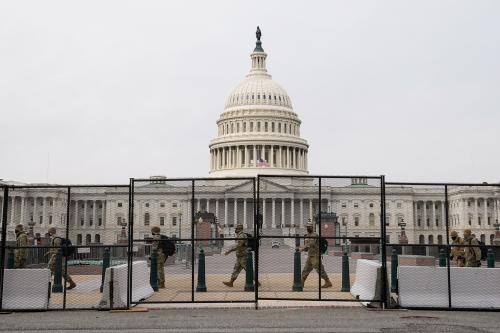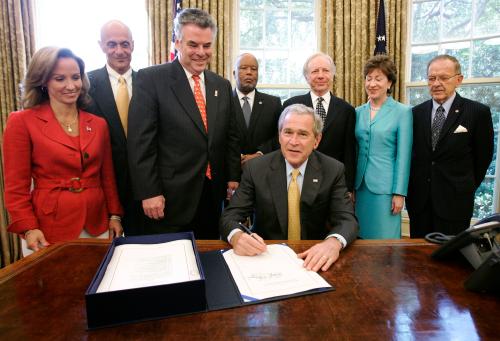The September 11 commission report is without a doubt one of the most thorough, most important and best studies by any such U.S. independent group in recent decades.
Sen. John F. Kerry, Massachusetts Democrat, and many other members of Congress were right to push for its creation. President Bush was right to give it prompt consideration and offer his own variations on its ideas.
But ironically, the commission report may be weakest in precisely those areas—specifically, intelligence reform—where its suggestions are garnering the most attention.
The president’s proposals help some, but do not solve all the problems and may worsen others. In the coming weeks, therefore, Congress and the Bush administration have a lot of work to do, if whatever reforms ultimately adopted are to do more good than harm.
The commission’s recommendations are far-reaching. But the most important can be summarized as follows:
- A new position of National Intelligence Director would be created and located within the broader White House staff. That person would not run the CIA, as does the current director of intelligence. But he or she would have budgetary power and some appointment powers over intelligence agencies in the Pentagon and elsewhere, which the current director does not. The director would have an extensive staff, also within the White House system, responsible for overall counterterrorism intelligence policy and coordination. This staff would be known as the National Counterterrorism Center.
- A number of national intelligence centers would be created, and housed within whichever existing intelligence agency seemed most appropriate, to handle various other aspects of intelligence such as studying China or addressing weapons proliferation. All paramilitary capability would be consolidated within the Pentagon, the CIA thus surrendering much of its capacity in this regard.
- A further aspect of the proposed consolidation and reorganization is that the lines separating domestic from foreign intelligence would be largely erased. This change would go well beyond the Patriot Act, which allows and encourages intelligence exchange between domestic and foreign investigations. Under the commission’s proposal, the locus for those different types of investigations would be the same.
- Finally, the commission would streamline congressional oversight of the intelligence community. Rather than have House and Senate policy committees provide broad guidance, and then defense appropriations subcommittees allocate funding, the proposed new structure would carry out all these functions within a single committee in each house of Congress (or perhaps even a single joint committee).
President Bush’s own ideas, as unveiled Monday, echo the commission in its attention to Congress. But the president would change the concept of a national intelligence director, limiting budgetary powers and other bureaucratic prerogatives while also taking the post out of the White House staff.
These suggestions all have a logic behind them and merit further scrutiny. But several may have more cons than pros.
Before approving them, Congress needs to ask a lot of questions—and also probably revamp some of the ideas. Consider several important counterarguments to the suggestions:
- By being within the White House, the new intelligence czar would be closer to the president—and thus more likely to be influenced by politics. The Federal Reserve Board chairmanship is sometimes used as the analogy for this new intelligence post. But Alan Greenspan does not work at or near 1600 Pennsylvania Ave. and is never confused with the president’s political team. Nor should the head of U.S. intelligence. Staggering his term so it does not coincide with that of presidents would only partly solve this problem. President Bush’s proposal thus seems the more sensible on this score.
- The new intelligence director might actually wind up weaker than the current one. Today’s director of intelligence has bureaucratic clout by virtue of running the CIA. The new czar would lose that. Pentagon control over the intelligence budget could actually be strengthened as a result. The president’s proposal might worsen this risk by depriving the new national intelligence director of the budgetary power over all U.S. intelligence agencies—including those at the Pentagon—that the September 11 Commission suggested he have.
- Creating intelligence centers within the halls of existing individual agencies is often likened to the military’s Goldwater-Nichols reforms of 1986, and specifically to the strengthening of the combatant commands (like Central Command, which carried out both Iraq wars and the Afghanistan operation). But the Pentagon’s regional commands are based away from the main military services to ensure their independence. Their leaders are four-star officers equal in rank to the chairman of the Joint Chiefs. The intelligence centers, by contrast, could be more beholden to the agencies where they would be situated and from which they would draw much of their staff.
- Consolidating all covert action capability in the Pentagon sounds efficient. But the CIA’s covert action teams were at least as instrumental in the victory in Afghanistan in late 2001. It was also the CIA, not the Pentagon, that first armed the Predator unmanned aerial vehicle to allow immediate targeting of terrorist leaders. So it is not clear the Pentagon does a better job in this sort of thing.
On balance, immediate hearings and some immediate action in response to the September 11 Commission recommendations make sense. However, a little patience is in order before we overhaul the intelligence community. It is always tempting to think bureaucratic reform will solve our fundamental national security problems. But it is rarely that simple.



Commentary
Op-edThe 9/11 Commission Report: Limits of Hasty Reform
August 5, 2004